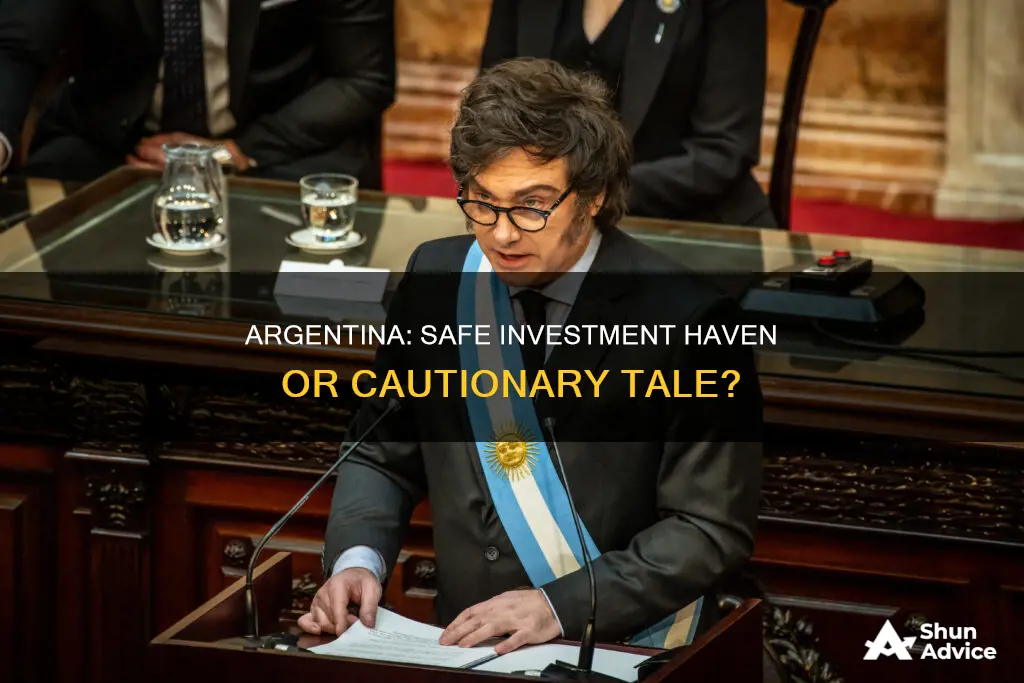
Argentina has a population of 46 million, with 16 million of those people living in and around the capital, Buenos Aires. The country presents investment and trade opportunities, particularly in agriculture, mining, energy, health, infrastructure, information technology, and tourism. However, economic uncertainty, interventionist policies, high inflation, and persistent economic stagnation have prevented Argentina from maximizing its investment potential. Since President Javier Milei took office in December 2023, the government has started removing some interventionist policies and is determined to make structural changes to mould Argentina into a market-friendly economy. Both foreign and local investors typically operate under equitable conditions in Argentina, although there are some sectors where foreign participation is barred, such as aviation and media.
| Characteristics | Values |
|---|---|
| Population | 46 million |
| Capital | Buenos Aires |
| Population of Buenos Aires | 3 million |
| Population of Buenos Aires province | 13 million |
| Economic uncertainty | High |
| Interventionist policies | High |
| Inflation | High |
| Economic stagnation | High |
| Poverty | High |
| Exchange rate pressure | High |
| Foreign participation | Barred in aviation and media |
| Foreign ownership | Limited in rural lands, water bodies, and border areas |
| Tax load | Burdensome and unpredictable |
| Labour regulations | Inflexible |
| Investment promotion | Ministry of Foreign Affairs, International Trade, and Worship |
| Investment screening mechanism | None |
| Investment opportunities | Agriculture, mining, critical minerals, energy, health, infrastructure, information technology, tourism, the knowledge-economy, and administrative services |
What You'll Learn

Argentina's economic potential
Despite recent economic struggles, Argentina continues to play an important role in the global economy, especially with regard to its agricultural production. The agricultural sector represents 5.9% of the country's GDP and employs 1% of the population, according to the World Bank. The sector is mainly based on livestock farming (cattle production is a key economic sector and a major source of export earnings), cereal cultivation (wheat, corn and transgenic soy), citrus fruits, tobacco, tea and grapes (mostly for the production of wine). Argentina is the world's largest exporter of soy-derived products and the world's third-largest producer of such products.
Argentina is also rich in energy resources and has great potential in terms of raw materials. It is the fourth-largest natural gas producer in Latin America, and it has the world's third-largest shale gas reserve and the fourth-largest lithium reserve.
After two years of recession, GDP is projected to grow by 5% in 2025 and 2026 (IMF). Quarterly growth rebounded to 3.4% in Q3/2024, according to a monthly activity indicator. Agriculture, livestock, and mining led the expansion, with manufacturing, construction, and trade also showing strong recoveries. Real credit is increasing. Over the forecast horizon, recovery will be driven by real wage gains, declining inflation, and a stronger labour market, boosting private consumption. Investments will rise with improved confidence and a new preferential regime for large projects.
Cash Offers for Investment Houses: Pros and Cons
You may want to see also

Foreign investment in Argentina
There are several sectors in Argentina that present investment and trade opportunities, particularly in agriculture, energy, health, infrastructure, information technology, and mining. The country also has a large population of 46 million people, with over a third of them centred in and around the capital, Buenos Aires. This provides a significant consumer market for businesses looking to invest in the country.
However, there are still some challenges and limitations to foreign investment in Argentina. Foreign participation is barred in certain sectors, such as aviation and media, and there are restrictions on foreign ownership of rural lands, water bodies, and border areas. Additionally, both domestic and international firms have cited a burdensome and unpredictable tax load, along with inflexible labour regulations, as hindrances to additional investment. These factors contribute to the perception of economic uncertainty and stagnation that has plagued Argentina in recent years.
Despite these challenges, there are signs that Argentina is making progress and becoming more attractive to foreign investors. The country finished 2022 with better-than-expected economic growth of 5.2%, and the government has introduced tax incentives for investors in the automotive sector. Additionally, prominent figures like Elon Musk have publicly endorsed investing in Argentina, further boosting its profile as a potential investment destination.
In conclusion, while there are still some risks and uncertainties associated with investing in Argentina, the country presents significant opportunities for foreign investment, particularly in sectors such as agriculture, energy, and infrastructure. As the government continues to implement market-friendly policies and address economic challenges, Argentina may become an increasingly attractive destination for investors seeking new opportunities and undervalued assets.
Savings or Investments: The Best Way to Utilize Your 100K
You may want to see also

Argentina's economic priorities
Argentina has a population of 46 million, with 16 million of those people living in and around the capital, Buenos Aires. The country presents investment and trade opportunities, particularly in agriculture, mining and critical minerals, energy, health, infrastructure, information technology, tourism, the knowledge economy, and administrative services.
However, economic uncertainty, interventionist policies, high inflation, and persistent economic stagnation have prevented the country from maximizing its potential. In 2022, the government identified its top economic priorities as reaching an agreement with the IMF to renegotiate the 2018 Stand-By Arrangement, controlling inflation, and continuing the post-pandemic economic recovery. While Argentina finished 2022 with better-than-expected economic growth at 5.2%, it still faces challenges such as high poverty rates (over 43%), high inflation (95%), and mounting exchange rate pressure.
Since President Javier Milei took office in December 2023, the government has started removing some interventionist policies and is working to make structural changes to mould Argentina into a market-friendly economy. This has led to a shift in investor sentiment and a rally in Argentine stocks, indicating that the country may be becoming more attractive to investors.
Both foreign and local investors typically operate under equitable conditions in Argentina. However, foreign participation is barred in certain sectors, such as aviation and media, and there are limitations on foreign ownership of rural lands, water bodies, and border areas. Additionally, unpredictable tax loads and inflexible labour regulations have been cited as hindrances to additional investment. To attract investors, Argentina has introduced tax incentives for the automotive sector and a complete exemption from export tariffs on manufactured goods.
Union Carbide's Indian Investment: Why India?
You may want to see also

Argentina's socio-political ecosystem
Argentina has a population of 46 million, with over a third of these people living in and around the capital, Buenos Aires. The country presents investment and trade opportunities in a range of sectors, including agriculture, mining, energy, health, infrastructure, information technology, and tourism. However, foreign participation is barred in certain sectors, such as aviation and media, and there are limitations on foreign ownership of rural lands, water bodies, and border areas.
Economic uncertainty, interventionist policies, high inflation, and persistent economic stagnation have prevented Argentina from maximising its potential. In 2022, the government identified its top economic priorities as reaching an agreement with the IMF to renegotiate the 2018 Stand-By Arrangement, controlling inflation, and continuing the post-pandemic economic recovery. While Argentina finished 2022 with better-than-expected economic growth of 5.2%, it also faced high poverty rates (over 43%), high inflation (95%), and mounting exchange rate pressure.
Since President Javier Milei took office in December 2023, the government has started removing some interventionist policies and is working to make structural changes to mould Argentina into a market-friendly economy. This has included introducing tax incentives for investors in the automotive sector.
The Risk-Free Investment: What's the Best Option?
You may want to see also

Argentina's relationship with the market
Argentina has a complex relationship with the market. For years, it was considered a global financial pariah, but investors have recently sensed opportunities in the country, with its interesting prospects and massively undervalued assets.
Since President Javier Milei took office in December 2023, the government has started removing some interventionist policies and is determined to make structural changes to mould Argentina into a market-friendly economy. Argentina presents investment and trade opportunities, particularly in agriculture, mining and critical minerals, energy, health, infrastructure, information technology, tourism, the knowledge economy, and administrative services.
However, economic uncertainty, some interventionist policies, high inflation, and persistent economic stagnation have prevented the country from maximising its potential. Foreign participation is barred in certain sectors like aviation and media, and there are limitations on foreign ownership of rural lands, water bodies, and border areas. Both domestic and international firms often cite a burdensome and unpredictable tax load along with inflexible labour regulations as hindrances to additional investment in Argentina.
Despite these challenges, Argentina's relationship with the market is improving. Argentine stocks have gone on an incredible rally that promises to continue, dragging along rising valuations in the beleaguered sovereign bond sector as a shift in investor sentiment points to change in the political class' relationship with the market.
Green Finance: Haven's Investment Management Strategy
You may want to see also
Frequently asked questions
There are mixed opinions on this. While some say that Argentina is back in the game from a financial standpoint, others say that it is still considered a global financial pariah.
Agriculture, mining and critical minerals, energy, health, infrastructure, information technology, tourism, the knowledge-economy, and administrative services.
Economic uncertainty, interventionist policies, high inflation, and persistent economic stagnation have prevented the country from maximising its potential.
Since President Javier Milei took office in December 2023, the government has started removing some interventionist policies and is determined to make structural changes to mould Argentina into a market-friendly economy.
Argentina recently introduced tax incentives for investors in the automotive sector, which encompass accelerated depreciation and prompt reimbursement of VAT on purchases of new capital equipment, along with a complete exemption from export tariffs on manufactured goods.







